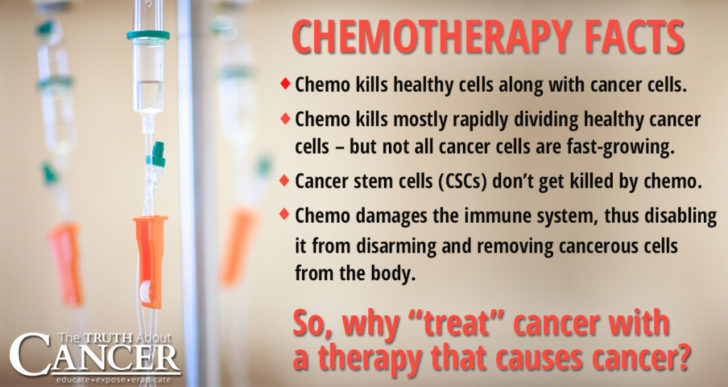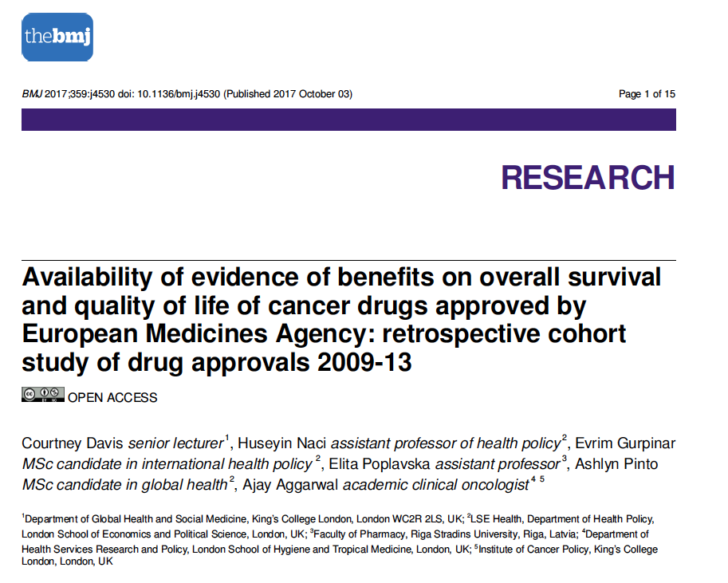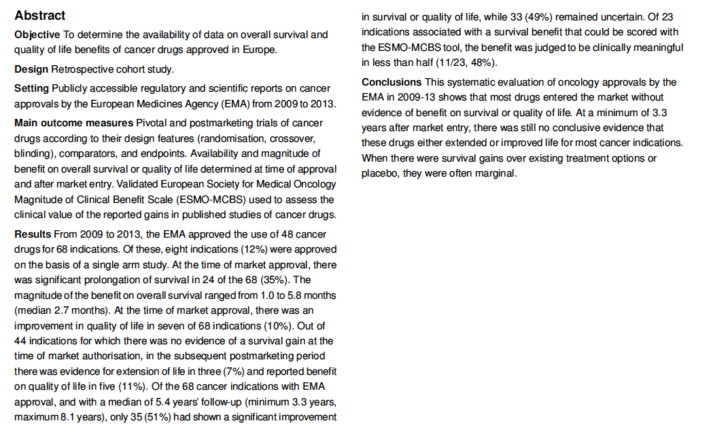Not news but the implications are points to ponder.

Points to ponder:
- Health care costs continue to skyrocket. These drugs are expensive and provide marginal if any benefit. Only Big Pharma, and the institutions and doctors that provide the treatments benefit for sure.
- To the extent the drugs do work, a couple months or so of extended life may be valuable to people.
- But at what point are the costs of the treatment too out of proportion for the benefits that only may derived? Who should make that decision?
- One can readily see how moves to single-payer insurance will force the government to make these decisions and ration care.
- Who should make these decisions? Government or insurance companies? There’s a choice for you.
- But if new drugs and treatment are not attempted, we may wind up missing opportunities for research breakthroughs — although there never has been much of this. The vaunted “War on Cancer” has largely been a bust.
- A recent survey indicates physicians don’t have much confidence in chemotherapy.
No doubt there are many other points to ponder. But these are tough issues that must be addressed somehow. The cost of end of life care is destroying the quality and quantity of healthcare available to those who are not at end of life.
Abstract and media release below.
###
No clear evidence that most new cancer drugs extend or improve life
Study prompts calls to ‘raise the evidence bar’ for approval of new cancer drugs
BMJ
Even where drugs did show survival gains over existing treatments, these were often marginal, the results show.
Many of the drugs were approved on the basis of indirect (‘surrogate’) measures that do not always reliably predict whether a patient will live longer or feel better, raising serious questions about the current standards of drug regulation.
The researchers, based at King’s College London and the London School of Economics say: “When expensive drugs that lack clinically meaningful benefits are approved and paid for within publicly funded healthcare systems, individual patients can be harmed, important societal resources wasted, and the delivery of equitable and affordable care undermined.”
The research team analysed reports on cancer approvals by the European Medicines Agency (EMA) from 2009 to 2013.
Of 68 cancer indications approved during this period, 57% (39) came onto the market on the basis of a surrogate endpoint and without evidence that they extended survival or improved the quality of patients’ lives.
After a median of 5 years on the market, only an additional 8 drug indications had shown survival or quality of life gains.
Thus, out of 68 cancer indications approved by the EMA, and with a median 5 years follow-up, only 35 (51%) had shown a survival or quality of life gain over existing treatments or placebo. For the remaining 33 (49%), uncertainty remains over whether the drugs extend survival or improve quality of life.
The researchers outline some study limitations which could have affected their results, but say their findings raise the possibility that regulatory evidence standards “are failing to incentivise drug development that best meets the needs of patients, clinicians, and healthcare systems.”
Taken together, these facts paint a sobering picture, says Vinay Prasad, Assistant Professor at Oregon Health & Science University in a linked editorial.
He calls for “rigorous testing against the best standard of care in randomized trials powered to rule in or rule out a clinically meaningful difference in patient centered outcomes in a representative population” and says “the use of uncontrolled study designs or surrogate endpoints should be the exception not the rule.”
He adds: “The expense and toxicity of cancer drugs means we have an obligation to expose patients to treatment only when they can reasonably expect an improvement in survival or quality of life.” These findings suggest “we may be falling far short of this important benchmark.”
This study comes at a time when European governments are starting to seriously challenge the high cost of drugs, says Dr Deborah Cohen, Associate Editor at The BMJ, in an accompanying feature.
She points to examples of methodological problems with trials that EMA has either failed to identify or overlooked, including trial design, conduct, analysis and reporting.
“The fact that so many of the new drugs on the market lack good evidence that they improve patient outcomes puts governments in a difficult position when it comes to deciding which treatments to fund,” she writes. “But regulatory sanctioning of a comparator that lacks robust evidence of efficacy, means the cycle of weak evidence and uncertainty continues.”
In a patient commentary, Emma Robertson says: “It’s clear to me and thousands of other patients like me that our current research and development model has failed.”
Emma is leader of Just Treatment, a patient led campaign with no ties to the pharmaceutical industry, which is calling for a new system that rewards and promotes innovation, so that more effective and accessible cancer medicines are brought within reach.
###


Well if so this would be a massive scandal and i would love nothing more than to see the medical world plunged into scandal, but, i am suspicious of the idea chemo doesnt work an I dont trust those who claim to know “the truth” about cancer. What we need are positive developments.
Genome editing might help people get born without inheriting a known disease. But it won’t eliminate gene fusion, translocations, aneuploidy, and other large structural errors.
Every cell division is a series of stunts that regularly go wrong. We will continue to get cancer, neurological, and metabolic diseases as we develop.
The burgeoning field of immuno-oncologics has yielded some very impressive results, with PDL1 checkpoint inhibitors leading the way. Merck’s Keytruda, approved in late 2014, obviously falls outside the scope of drugs reviewed in the study. I would also venture to guess thT within the next decade, we’ll start to see gene editing approaches (CRISPR) address the underlying genetic basis for cancer as well…
It is my understanding that chemotherapy following surgery for some types of breast cancer is standard treatment in the USA, and it is well established that the use of chemotherapy following surgery greatly improves the 5 year survival rate for certain types of breast cancer.
I note this study was done by Kings College. If the study was funded by Britain’s NHS, then there was a built-in bias from the funding agency to justify not spending money to extend the lives of cancer patients, who are usually older because cancer tends to be an age onset disease. The benefit from withholding treatment is 2-fold for the UK government:’
1. Save medical expenditures
2. Less retirement payments.
Often important differences in outcomes for sub-groups can be hidden by gross numbers. For example, we hear that cancer survival rates in Europe are comparable to the US. However, when one looks at the sub-group of males with Gleason 8 or 9 (particularly aggressive) prostate cancer, the 10 year cancer specific survival rate for top US hospitals is much higher than for Europe (i.e. 85+% versus 63%). My theory is that prompter treatment in the USA combined with more aggressive post-operative prophylactic treatment (e.g. radiation + hormone therapy) explain the significantly higher survival rate in the USA. If one looks at citizens as only having value in terms of their future value to society, then Europe’s approach is considered moral. If, on the other hand, one believes that each individual has certain rights (see Declaration of Independence), then the USA’s approach is better, especially if you happen to have Gleason 8 or 9 prostate cancer.
Larry, if it seems a little odd to you, it is because you are a little odd yourself. Every one of us is a little odd, so there is no guarantee that a drug that has helped you will be as helpful to your nearest relative. Even if we were able to clone you and let your clone live a similar life, it would not be wise to expect him to develop a disease of exactly the same type. Even as your current myeloma develops (hopefully slowly enough that it can be managed), it progresses through different states and diversifies into independent branches. There is no guarantee that all of its subclones will be equally treatable. I think you were lucky that the first thing your doctor tried worked on you, or maybe your doctor has done a test to identify your malignancy and its susceptibility to that drug.
Here is a good paper describing the diversity of myeloma, if you are interested. It should give you an idea of how lucky you are:
https://www.nature.com/articles/ncomms3997
Folks where I work have recently discovered that one genotype of pancreatic cancer is fully treatable with an antibody-linked drug, with zero disease-specific mortality in a 5-year follow-up (compared to survival times measured in months for other types). The prevalence of that treatable genotype is about 15% in the U.S. population.
Let’s say I have just been diagnosed with a pancreatic cancer (and by “diagnosed” I mean the usual stuff — gross examination + Bx); I can estimate my odds of survival at 0.15 times the odds that my doctor is aware of my germline and tumor genotypes and knows what matching treatments are available. The resulting likelihood will not be too high. Things are beginning to change, but most cancer treatment today still proceeds by trial and error.
“I have myeloma and the medicine my doctor put me on quickly put me into remission, removed the pain and put my blood numbers back to normal.”
Did he charge you for it? That makes him and the company who make the medicine evil according to Steve Pelosi. Also, because it does not cure cancer in 100% of the population with no side-effects it has to be demonized and then taken away from you, of course.
“While most vaccine research, including that for HPV which is shown to greatly reduce vaginal cancers, is in the funding doldrums it is expected that private Pharma money goes where the big payoff is regardless of the long-term effectiveness of these drugs.”
Oh, yes, of course. ‘Cause Big Bad Huge Oh My God It’s Giant! Pharma are only after your money and thus free markets and capitalism is evil and the government should take over and run everything. Hi, Nancy!
Oh, and BTW, Pharma would make a LOT more money if they had a miracle cure for cancer they could sell versus supposedly mediocre cancer drugs.
Funny how the skepticism shown to drugs is not shown to similar claims made about vaccines. Could they be hype too, maybe? As long as we have decided the making of money in health is now bad and evil, could be it be claims of vaccines being so effective against cancer are being made by vaccine makers precisely because they have a “lack of funding?” Hmmm?
I read this blog regularly though I don’t have any background to understand some of the claims made here. This one seems a little odd to me. I have myeloma and the medicine my doctor put me on quickly put me into remission, removed the pain and put my blood numbers back to normal. It’s been two and a half years now. I don’t know how long I would have gone without the medicine but I was already in a fair amount of pain and having difficulties due to issues with my blood. I’m happy to have my medicine and relief.
Since all classical “anti-cancer” drugs are actually metabolic poisons which target either rapid DNA activity or protein synthesis it was well recognized from the start that all chemotherapy was a “Hail-Mary” treatment of last hope. While targeted therapy using special immune markers have great potential on paper at the present time they have been far from successful with often lethal side-effect for a significant portion of the patients.
What has to be recognized is that while of dubious practical value new chemotherapy drugs are very commercially successful and because of the emotional effect of a cancer diagnosis demand is great. This emotional “try something” response is also the political underpinning of the ‘approval’ for most of these drugs by regulators.
While most vaccine research, including that for HPV which is shown to greatly reduce vaginal cancers, is in the funding doldrums it is expected that private Pharma money goes where the big payoff is regardless of the long-term effectiveness of these drugs.
The problem with most cancer drugs is not that they don’t work as advertised; it is that the average physician does not have the knowledge or resources to find out whether the intended target for a drug exists in the patient he is treating, whether it is within the specs for the drug, and whether or not there are adverse factors interacting with the target or with the drug; whether there may be alternative pathways that can be shut down or activated; whether the logic of the cancer-causing mechanism requires a simultaneous application of several drugs. In other words, when the mechanism is not known, hit-and-miss chemotherapy is not very effective.
Such considerations have recently given rise to “precision medicine” — a knowledge-based approach to cancer treatment.
The researchers, based at King’s College London and the London School of Economics say: “When expensive drugs that lack clinically meaningful benefits are approved and paid for within publicly funded healthcare systems, individual patients can be harmed, important societal resources wasted, and the delivery of equitable and affordable care undermined.”
A good case can be made that
a. air quality effects on health are minimal or non-existent. b. the cost of improvements in air quality is very high.
Given the money, individuals can make better and more individualistic decisions.
Years of medical practice have shown me that chemotherapy and other forms of cancer treatment are mostly useless. Other than some breakthroughs in the treatment of certain childhood leukemias, there has been virtually no significant improvement despite billions of dollars spent in research. The studies that purport to show benefit may extend life on average a few weeks or months. But the side effects of the therapy usually take most of the joy out of that extra time. Practically all the significant discoveries in the history of medicine have come about by accident. Offhand I can’t even think of one that came to light through diligent planned research.